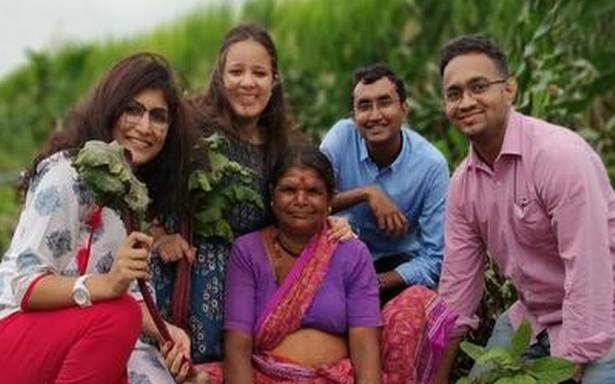S4S is promoting solar dehydration as a means to empower women farmers and reduce food waste
Life is not easy for the ‘ugly ducklings’ of the agricultural world. For all the perfectly shaped fruits and vegetables that we buy from the green grocers, there are thousands left on their stalks to rot unharvested in the field simply because they do not meet the aesthetic criteria of retailers.
Mumbai-based foodtech innovator Science 4 Society (S4S) Technologies has been working to cut down on this waste by promoting solar dehydration as a way to preserve such produce. In the wake of the lockdown, the company, founded in 2014 by young entrepreneur Vaibhav Tidke along with collegemates Ganesh Bhere, Tushar Gaware, Shital Somani, Ashwin Pawade, Nidhi Pant and Swapnil Kokate, has empowered 2,700 women farmers and 200 micro-entrepreneurs near Aurangabad by training them in dehydration of natural produce.
They do this through the patented Solar Conduction Dryer (SCD), a portable solar-powered machine that dries vegetables and spices while retaining nutrients.
“When we started, the business model was about selling our dehydration equipment to farmers. But we realised eventually that what most farmers want is an alternate source of income during the dry season. That’s how we pivoted, and rather than just providing technology, we started buying back the produce in 2018. So we are now not just selling the machine, but also the food dehydrated by it,” says company co-founder Nidhi Pant in a telephone interview from Mumbai.
The technology won S4S the 2020 Ashden Award for Energy and Livelihoods, supported by the Waterloo Foundation, UK. It has been installed in 1,200 sites and is used in France, Jamaica, Nepal, Vietnam, Sri Lanka, Kenya and Bangladesh, besides India.
Components of the dehydrator vary according to the size and model selected, though all of them are designed to be user-friendly, especially for women. “We give a cutting machine, a primary processing dryer and solar conduction dryer in our package. The equipment is non-electrical, as power outages are quite common in villages. It is as simple to use as a domestic mixer or grinder. Our dehydrator helps to maintain moisture, colour and aroma, and completes the process in six to seven hours, to minimise microbial growth,” says Nidhi.
Four machines with a capacity of 200 kilograms output, cost around ₹1,40,000. Purchasing the equipment isn’t mandatory, as it can also be hired by farmers through financial assistance.
Mutual benefit
The company’s twin-pronged business model works with growers and women processors in villages. “S4S Technologies procures the B and C grade produce (that has been rejected by commercial retail sales because of its non-standard appearance) and delivers it to the women who have been trained in the dehydration process. Since 2019, we have been ensuring that the farmers earn an assured income from our work for at least nine months of the year,” says Nidhi.
S4S trains women farmers in clusters of 20 per village guided by a field executive, to work on their dehydration projects. The decision to target women agriculturalists was conscious, she says. “Due to the water shortage in the Marathwada region, the growing season is limited to four months of monsoon here. Male farmers are more likely to migrate in search of work elsewhere during the dry season, while the womenfolk are usually left behind. Operating our dehydration equipment allows women farmers to earn from the comfort of their homes. Besides, women are more open to trying new things,” she says.
Sunita Dhyaneshwar Muthe, 30, from Khamkheda village in Nashik district, Maharashtra, is one of the many micro-entrepreneurs who have learned to become financially independent with the help of S4S work. “I am from a farming family that grows maize, cotton and bajra. For the past three years, instead of working in the nearby factory during the dry season, I have been drying garlic, turmeric and onion on a contractual basis for S4S at home. I have earned up to ₹50,000 last year, which helped us buy seeds, repay vehicle loans and budget other household expenses. Earlier, we would have to borrow money at high interest rates just to buy seeds,” she says.
Building stability
Amol Padul, an S4S agriculture extension officer, says his mother, Prabhavati from Hatmali village was among the earliest women agriculturalists to get trained in the project. “My mother started with farming and dehydrating beetroot, ginger and other crops for S4S. She was able to educate me in a city college and fulfil other family responsibilities with her income as a micro-entrepreneur. I feel we have regained some of our self-respect with this kind of ancillary skill,” he says.

The S4S solar dehydrator is a non-electrical device that helps to preserve natural produce. Photo: Special Arrangement/THE HINDU
Saving for posterity
While S4S has its own natural snack brand DesiVdesi made with dehydrated produce, it also supplies dried raw material like garlic, ginger, onion, turmeric, coriander and so on, to big players like Nestle, Sodexo, Marico, IRCTC, Taj Stats and Capital Foods. The mechanism can also be used to preserve meats, seafood and spices.
The lockdown validated S4S Technologies’ core work, as more farmers returned home to wait out the lean season and started exploring dehydration equipment. Besides earning a decent wage through the decentralised dehydration, the equipment also helped them to preserve their harvest when the wholesale markets closed down last year.
Already present in Mumbai, Pune and Hyderabad with 700 corporate customers, S4S aims to expand operations add more products to its list, including pulses this year. It is funded by Shell Foundation, Factor (E) Ventures, Acumen Fund and DBS Foundation.


